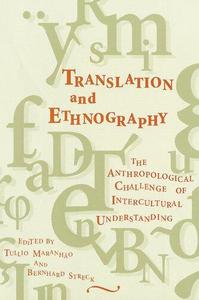
Translation and Ethnography: The Anthropological Challenge of Intercultural Understanding By Tullio Maranhão (editor), Bernhard Streck (editor)
2003 | 220 Pages | ISBN: 0816523037 | PDF | 13 MB
To most people, translation means making the words of one language understandable in another; but translation in a broader sense-seeing strangeness and incorporating it into one's understanding-is perhaps the earliest task of the human brain. This book illustrates the translation process in less-common contexts: cultural, religious, even the translation of pain. Its original contributions seek to trace human understanding of the self, of the other, and of the stranger by discovering how we bridge gaps within or between semiotic systems.Translation and Ethnography focuses on issues that arise when we attempt to make significant thematic or symbolic elements of one culture meaningful in terms of another. Its chapters cover a wide range of topics, all stressing the interpretive practices that enable the approximation of meaning: the role of differential power, of language and so-called world view, and of translation itself as a metaphor of many contemporary cross-cultural processes. The topics covered here represent a global sample of translation, ranging from Papua New Guinea to South America to Europe. Some of the issues addressed include postcolonial translation/transculturation from the perspective of colonized languages, as in the Mexican Zapatista movement; mis-translations of Amerindian conceptions and practices in the Amazon, illustrating the subversive potential of anthropology as a science of translation; Ethiopian oracles translating divine messages for the interpretation of believers; and dreams and clowns as translation media among the Gamk of Sudan. Anthropologists have long been accustomed to handling translation chains; in this book they open their diaries and show the steps they take toward knowledge. Translation and Ethnography raises issues that will shake up the most obdurate, objectivist translators and stimulate scholars in sociolinguistics, communication, ethnography, and other fields who face the challenges of conveying meaning across human boundaries.
